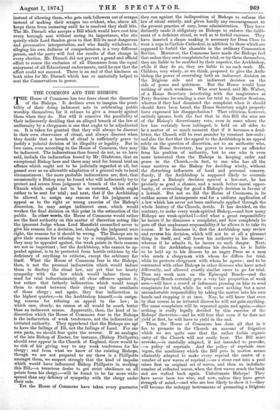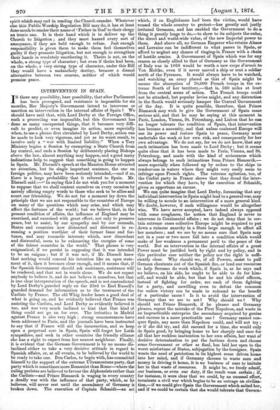Thu ; COMMONS AND THE BISHOPS.
THE Houseof Commons has two fears about the discretion of the Bishops. • It declines even to imagine the possi- bility of their doing indiscreet acts in celebrating public worship themselves, for it refuses to give a remedy against them when they do. Nor will it conceive the possibility of their indiscreetly deciding that an alleged breach of the law of uniformity by a clergyman is one that ought to be adjudicated on. It is taken for granted that they will always be discreet in their own observance of ritual, and always discreet when they decide that a breach of ritual is sufficiently grave to justify a judicial decision of its illegality or legality. But in two cases, even according to the House of Common, they may be indiscreet. The indiscretions thus feared do not, as we have said, include the indiscretion feared by Mr. Gladstone, that an exceptional Bishop here and there may send for formal trial an offence which ought not to be judicially regarded at all, but passed over as an allowable adaptation of a general rule to local circumstances ; the more probable indiscretions are, first, that occasionally a Bishop may be found who will indiscreetly try to protect and screen from judgment a breach of the law of the Church which ought not to be so screened, which ought rather to be sent for trial ; and next, that if the Archbishop be allowed to assign any reasons for his judgment on appeal as to the right or wrong exercise of the Bishop's discretion, he may assign indiscreet ones, which would weaken the final decision on this point in the estimation of the public. In other words, the House of Commons would rather see the final authority on this matter of discretion acting like the ignorant Judge whom Lord Mansfield counselled never to give his reasons for a decision, lest, though the judgment were right, the reasons for it should be wrong. The Bishops are to give their reasons for refusing to try a complaint, because as they may be appealed against, the weak points in their reasons are not so important ; but the Archbishop, who cannot be ap- pealed against, is to be protected from hostile criticism by the deficiency of anything to 'criticise, except the arbitrary fiat itself. What the House of Commons fear in the Bishops, then, is not the personal indiscretion which would induce them to disobey the ritual law, nor yet that too hearty sympathy with the law which would induce them to send for trial indiscriminately all clear offences against it, but rather that fatherly indiscretion which would tempt them to stand between their clergy and the assailants of those clergy ; and again, they fear indiscretion in the highest quarter,—in the Archbishop himself,—in assign- ing reasons for refusing an appeal to the law ; in which case, clearly, no reason at all would be much better than an indiscreet reason. Apparently, then, the kind of in- discretion which the House of Commons fear in the Bishops is the indiscretion of weak tenderness, not the indiscretion of irritated authority. They apprehend that the Bishops are apt to have the failings of Eli, not the failings of Laud. For our own parts, we should fear quite the reverse. If an analogue of the late Bishop of Exeter, for instance, (Bishop Phillpotts) should ever appear in the Church of England, there would be no risk of his giving way to any weak tenderness for his clergy ; and from what we know of the existing Bishops, though we are not prepared to say there is a Phillpotts amongst them, we suspect strongly that the kind of impulse which would have influenced Bishop Phillpotts in working this Bill,—a tenacious desire to get strict obedience on all points from his clergy,—will be found to be far more wide- spread than any delicacy of sympathy with the clergy under their rule.
Yet the House 'of Commons have taken every guarantee
they can against the indisposition of Bishops to enforce the law of ritual strictly, and given hardly any encouragement to the present practice of easy, loose administration. They have distinctly made it obligatory on Bishops to enforce the fulfil- ment of a deficient ritual, as well as to forbid excesses. They have inserted a clause making it necessary for Dean Close to wear a cope in Carlisle Cathedral, in addition to those which are supposed to forbid the chasuble in the ordinary Communion Service. Moreover, the Commons have made the Bishops feel that unless they send complaints for trial, or try them themselves, they are liable to be snubbed by their superior, the Archbishop, while if they do so, they are liable to no such snub. Mr. Childers very wisely, as we think, proposed to give the Arch- bishop the power of overruling both an indiscreet decision on the litigious side and an indiscreet decision on the side of peace and quietness. But the House would hear nothing of such weakness. Who ever heard, said Mr. Walter, of a Home Secretary interfering with the magistrates at Petty Sessions for sending a case for trial to Quarter Sessions, whereas if they had dismissed the complaint when it should should have been heard, the Home Secretary might properly have expressed his disapprobation I That criticism however,
i
entely ignores both the fact that in this Bill the wise use of the Bishop's discretionary veto, even in cases where the law has certainly been infringed, is held on all sides to be a matter of so much moment that if it becomes a dead- letter, the Church will be rent asunder by constant law-suits; and also the fact that the appeal to the Archbishop is an appeal solely on the question of discretion, not to an authority who, like the Home Secretary, has power to remove an offender from his position of authority, but to one who is even more interested than the Bishops in keeping order and peace in the Church,—in fact, to one who has all the same motives as the Bishop for deciding wisely, without the disturbing influences of local and personal concern. Surely, if the Archbishop is supposed likely to overrule for good a Bishop's decision against a law-suit, he has precisely as good a chance, and a much better moral oppor- tunity, of overruling for good a Bishop's decision in favour of a lawsuit. But not so did the House of Commons, in its sudden access of intemperate zeal for a uniform application of a law which has never yet been uniformly applied through the whole history of the Church, decide. It has decided, on the contrary, to make every weak-spirited Bishop,—and how many Bishops are weak-spirited I—feel what a great responsibility he incurs if he dismisses a complaint, and how completely he puts off that unpleasant responsibility if he allows it to take its course. If he dismisses it, first the Archbishop may review and reverse his decision which will not be at all a pleasant thing in itself, and will lower his authority in his diocese ; whereas if he admits it, he incurs no such danger. Next, even if the Archbishop confirms his decision, he is liable to be held up to his diocese by an angry Press as a man who sends a• clergyman with whom he differs for trial, while he protects clergymen with whom he agrees ; and to be contrasted with other Bishops in other dioceses who have acted differently, and allowed exactly similar cases to go for trial. Thus any weak man on the Episcopal Bench—and the Episcopal Bench certainly gets a very fair proportion of weak men—will have a crowd of influences pressing on him to send complaints for trial, while he will court nothing but a most uncomfortable responsibility by taking the matter into his own hands and stopping it at once. Nay, he will know that even by that course in an irritated diocese he will not gain anything. The same complaints will be repeated again and again,—since nothing is really legally decided by this exercise of the Bishops' discretion—and he• will fear that even if he does not yield at first, he will have to yield in the end.
Thus, the House of Commons has done all that in it lies to promote in the Church an amount of litigation which we are quite sure that the rather feeble organic unity of the Church will not easily bear. The Bill must provoke,—is carefully adapted, if not intended to provoke, —a policy of reprisals. And the policy of reprisals once began, the machinery which the Bill puts in motion seems admirably adapted to make every reprisal the centre of a number of new waves of reprisal ;—as a stone cast into a pool raises first an original set of waves, and then an indefinite number of reflected waves, when the first waves reach the bank and are wafted back again. Unfortunate Bishops! They have never been too wise, and now, unless they have great strength of mind,—and who are less likely to show it I—they will become the unhappy instruments of promoting a litigious
spirit which may end in rending the Church asunder. Whatever else this Public Worship Regulation Bill may do, it has at least done muchto render their name of 'Father in God' to their clergy an ironic one. It is their hand which is to deliver up the Church to litigation ; and they must hazard every sort of annoyance, if they are bold enough to refuse. Just enough. responsibility is given them to make them feel themselves guilty if they promote litigation, but not enough to strengthen their hands in reeolutely siuothering it. Theirs is not, on the whole, a strong type of character ; but even if theirs had been, on the whole, a very strong type of character, under this Bill they would have a melancholy destiny, because a dismal alternative between two courses, neither of which would promise peace.































 Previous page
Previous page